Potrebujeme váš súhlas na využitie jednotlivých dát, aby sa vám okrem iného mohli ukazovať informácie týkajúce sa vašich záujmov. Súhlas udelíte kliknutím na tlačidlo „OK“.
ASTM C1245/C1245M-12
Standard Test Method for Determining Relative Bond Strength Between Hardened Roller Compacted Concrete Lifts (Point Load Test) (Withdrawn 2019)
Automaticky preložený názov:
Štandardná skúšobná metóda pre stanovenie relatívnej Prídržnosť Tvrdené Roller hutného betónu výťahy (Point Load Test)
NORMA vydaná dňa 1.4.2012
Informácie o norme:
Označenie normy: ASTM C1245/C1245M-12
Poznámka: NEPLATNÁ
Dátum vydania normy: 1.4.2012
Kód tovaru: NS-10248
Počet strán: 8
Približná hmotnosť: 24 g (0.05 libier)
Krajina: Americká technická norma
Kategória: Technické normy ASTM
Kategórie - podobné normy:
Anotácia textu normy ASTM C1245/C1245M-12 :
Keywords:
bond strength, bonding agents, concrete bonding, roller-compacted concretes, Bond strength--cement/concrete materials, Concrete bonding, Hardened cementitious mixtures, Hardened concrete, Layered concrete construction, Point load strength test, Roller-compacted concrete, ICS Number Code 91.100.30 (Concrete and concrete products)
Doplňujúce informácie
| Significance and Use | ||||||||||||||||
|
This test method is used to measure the relative bond strength of roller-compacted concrete to other roller-compacted concrete by using a point load test at the joint (See Note 1). Relative bond strength is determined using drilled cores or cast cylindrical specimens in which the bond surface is essentially normal to the longitudinal axis at approximately the mid-length of the specimen. A splitting tensile stress normal to the bond surface is produced by applying a point load at the joint. The test results in a value that can be compared to that obtained by testing other specimens which are made from the same materials and by the same process. Results can be used for the purpose of comparing the relative bond strength of various joint conditions, joint treatments, or bonding materials applied to the joint. The test results are not to be taken as a true bond strength. Values of cohesion or tensile strength shall be determined by methods other than this test method. This test method may be used either for laboratory investigation by casting individual composite cylinders or by coring prototype structures or assemblies (Test Method C42/C42M). Note 1—This test may be used for testing the relative bond of other hardened hydraulic cement-based materials other than RCC. |
||||||||||||||||
| 1. Scope | ||||||||||||||||
|
1.1 This test method is intended for testing roller-compacted concrete specimens and covers determination of the relative bond between layers of roller-compacted concrete or other hardened concrete in multiple-lift forms of construction. It is applicable to all types of layered roller-compacted concrete where the total depth is sufficient to meet the minimum specimen length and diameter requirements of this test method. This test method is not intended to provide tensile strength results of the material tested. 1.2 The values stated in either SI units or inch-pound units are to be regarded separately as standard. The values stated in each system may not be exact equivalents; therefore, each system shall be used independently of the other. Combining values from the two systems may result in non-conformance with the standard. 1.3 The text of this standard references notes and footnotes, which provide explanatory material. These notes and footnotes (excluding those in tables and figures) shall not be considered as requirements of this standard. 1.4 This standard does not purport to address all of the safety concerns, if any, associated with its use. It is the responsibility of the user of this standard to establish appropriate safety and health practices and determine the applicability of regulatory limitations prior to use. |
||||||||||||||||
| 2. Referenced Documents | ||||||||||||||||
|
Podobné normy:
Historická
15.6.2010
Historická
15.6.2010
Historická
15.6.2010
Historická
1.12.2012
Historická
1.5.2009
Historická
1.5.2009
Odporúčame:
Aktualizácia technických noriem
Chcete mať istotu, že používate len platné technické normy?
Ponúkame Vám riešenie, ktoré Vám zaistí mesačný prehľad o aktuálnosti noriem, ktoré používate.
Chcete vedieť viac informácií ? Pozrite sa na túto stránku.


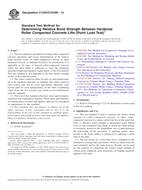
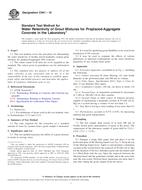 ASTM C941-10
ASTM C941-10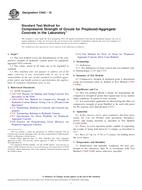 ASTM C942-10
ASTM C942-10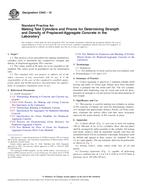 ASTM C943-10
ASTM C943-10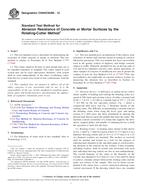 ASTM C944/C944M-12..
ASTM C944/C944M-12..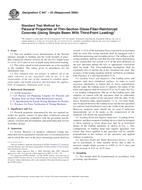 ASTM C947-03(2009)..
ASTM C947-03(2009)..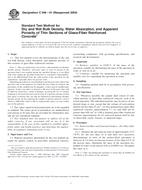 ASTM C948-81(2009)..
ASTM C948-81(2009)..
 Cookies
Cookies
